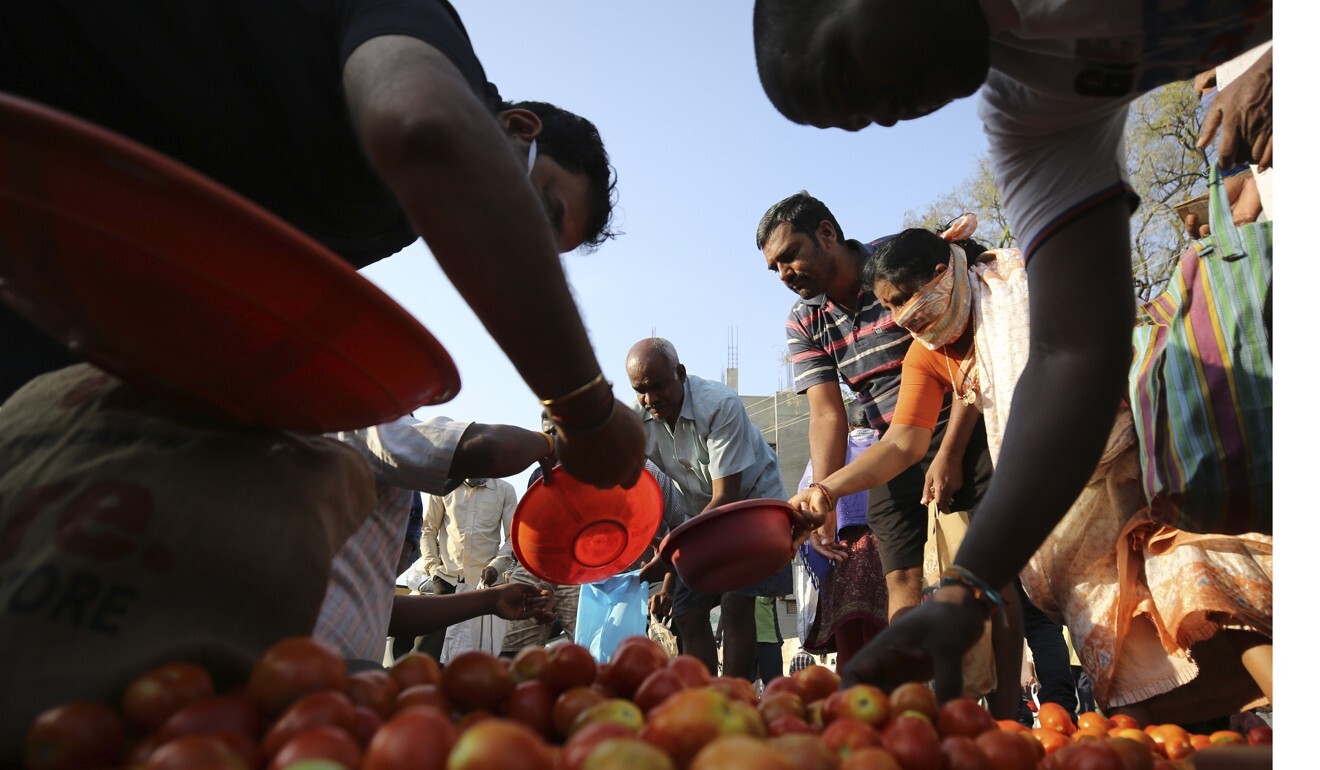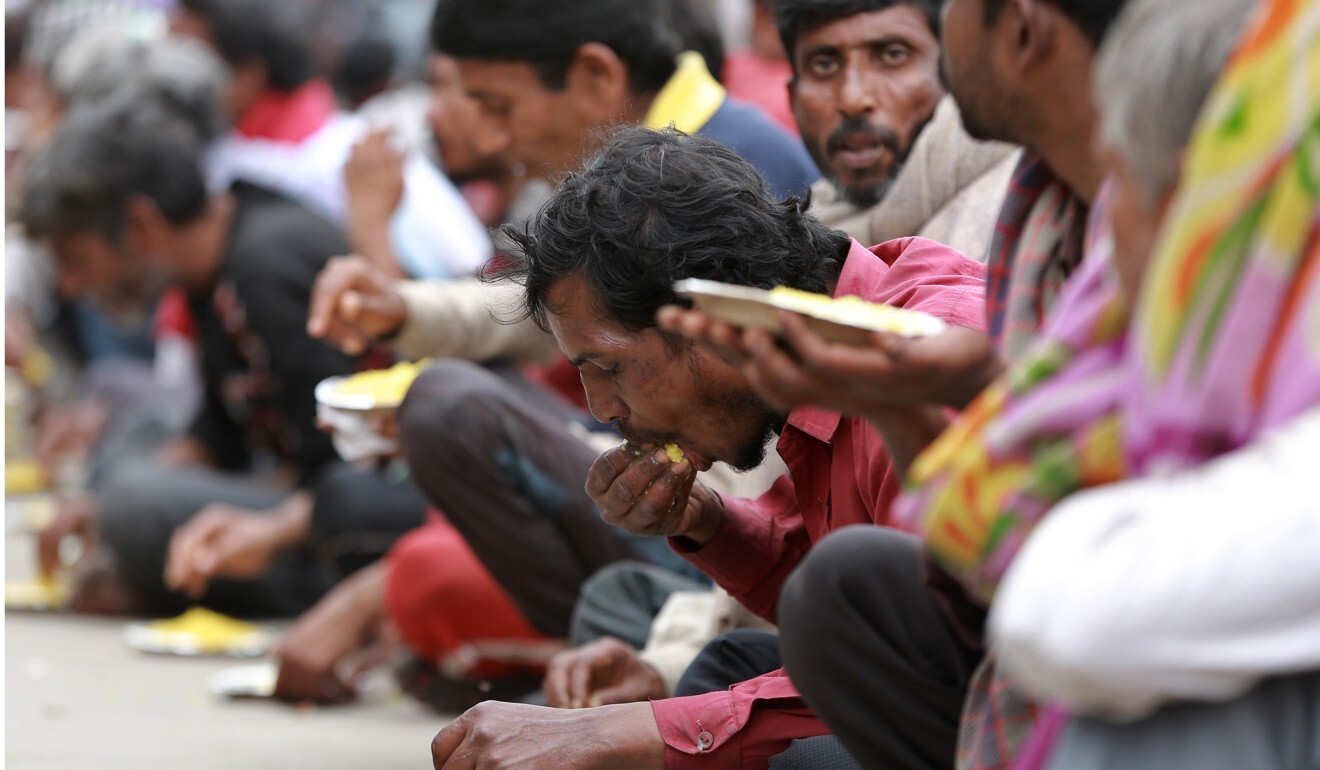
Modi says there’s enough food for India during coronavirus lockdown, but supply chains are choked
- India has unveiled a US$22 billion package to provide food rations and cash transfers to about 800 million people hit by the coronavirus lockdown
- Although India had a record harvest and has enough reserves, there are concerns about the food supply chain disruptions, especially for the poor
But authorities were quick to offer reassurances of sufficient grains such as wheat and rice for the country’s 1.3 billion people for the next four months, thanks to record harvests.
On Thursday, Finance Minister Nirmala Sitharaman announced an initial 1.7 trillion rupee (US$22.5 billion) package chiefly targeting poor households, while prioritising food distribution.

Under the newly launched “Pradhan Mantri Gareeb Kalyan Jojana” (Prime Minister’s Poor Welfare Scheme), each individual who already benefited from a subsidised public distribution system will be able to receive an additional five kilograms of either wheat or rice, and each household will get one kilogram of pulses free of cost for the next three months. The package will benefit about 800 million people.
Direct cash transfers of between 500 and 2,000 rupees will also be made to the most economically vulnerable, such as farmers, daily wage labourers, construction workers, disabled people, poor widows, and women self-help groups.
“No one will go hungry,” Sitharaman promised.
India’s Covid-19 cases reached 649 on Thursday, with 13 deaths.
The Food Corporation of India (FCI) – a government agency tasked with distributing food throughout the country – said it would have 100 million tonnes of grains in its warehouses by the end of April, compared with an annual requirement of up to 60 million tonnes.
“We will fill it up to 100 per cent soon. We’ve told the state governments to take grains as much as they require. The central government has now said the states can take up to three months worth stock in advance,” R.D. Nazeem, the FCI’s executive director for the south zone, told This Week in Asia as he listed the stockpiles in each state.
“We’ve procured enough sanitisers and masks for all our workers. Nowhere in the country will there be any food shortage. That’s for sure,” said Nazeem.
But concerns persist over the country’s food supply chain, given that interstate travel has been severely curtailed under the lockdown, with passenger train services and domestic flights suspended. Residents have been told to leave home only to get food supplies and access medical care, and warned they could face up to two years in jail and an unspecified financial penalty if they flout the rules.
Shopkeepers were worrying about keeping their stores open on Wednesday, complaining that suppliers were being barred from entering cities.
“I am getting milk, eggs and bread. But let’s say on an average, I get 100 packets of bread, today I’ve only got 20,” said a Delhi shopkeeper who identified himself as Pradeep.
“I’m giving it to people as and when they come. I’m not sure how long the existing stock is going to last,” he said.
94,000 return from virus hotspots to haunt India’s land of migrant workers
There have been reports of police officers tasked with enforcing the lockdown not letting in supplies due to a misunderstanding of the regulations. Traders have also expressed confusion over which goods will continue to flow in and out of the world’s seventh-biggest economy.
Supply trucks and buyers have faced difficulties entering Asia’s largest fresh produce wholesale market, Azadpur Subzi Mandi, in the capital New Delhi.
Fears of food supply disruptions are especially acute for India’s poor and members of its informal sector, which make up 90 per cent of the workforce. About 450 million people work in daily wage jobs while more than 300 million people live below the poverty line and 1.8 million are homeless.

“Our first concern is food, not the virus,” said Suresh Kumar, 60, a bicycle rickshaw rider in New Delhi who supports a family of six on his daily earnings of 300 rupees (US$4). “I don’t know how I will manage.”
While the country grows enough food for its entire population, it is not able to feed at least millions on a daily basis. Bottlenecked supply chain, inadequate logistics, food wastage and sharp societal inequalities keep the country ranked at 102 among 117 countries in the Global Hunger Index.
Kavitha Kuruganti, national convenor of the Alliance for Sustainable and Holistic Agriculture, a group that promotes food supply and distribution, said: “To ease the supply chains, we are suggesting that the government take up village-level mobile procurement of a set of food items beyond rice and wheat, and then distribute the same to urban poor and others who want to order, like retailers and restaurants.”
Coronavirus: India lockdowns put 450 million informal workers in dire straits
Some state governments such as Tamil Nadu and Karnataka started initiatives to offer free food in subsidised canteens run by the government, though Karnataka later stopped this as officials could not manage the swelling crowd.
Kerala became the first state to announce the home delivery of bundles of food essentials to the poor, while in Uttar Pradesh, India’s most populous state with 223 million people, volunteers were drafted in for door-to-door deliveries of food rations. About 2 million informal workers in the state registered on a government database had 1,000 rupees (US$13) deposited in their bank accounts.
Police in Assam started handing out rice in some of the poorest districts.
In New Delhi, authorities teamed up with charities and aid groups to map out areas where the poor congregate, and distributed 500 hot meals.
The government has also reportedly identified thousands of sensitive clusters in major metropolitan areas where a shortage of food and water could potentially lead to unrest.
Uma Lele, the president-elect of the International Association of Agricultural Economists, said the government should provide informal workers with an income during this lockdown period.
Additional reporting by Agence France-Presse, Associated Press and Bloomberg
Purchase the China AI Report 2020 brought to you by SCMP Research and enjoy a 20% discount (original price US$400). This 60-page all new intelligence report gives you first-hand insights and analysis into the latest industry developments and intelligence about China AI. Get exclusive access to our webinars for continuous learning, and interact with China AI executives in live Q&A. Offer valid until 31 March 2020.

